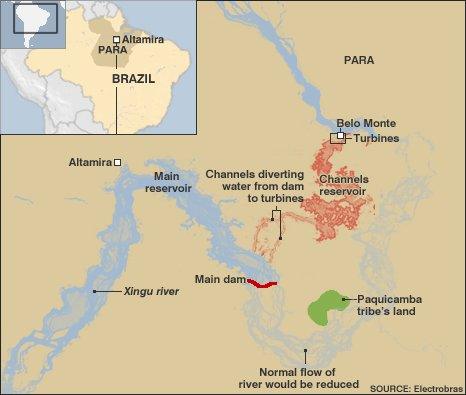Brazil rejects request to halt Belo Monte dam in Amazon
- Published

Local indigenous groups have been vocal opponents of the project
Brazil has said a request to halt work on its massive hydro-electric dam in the Amazon rainforest is unjustified despite environmental concerns.
Brazil's foreign ministry was responding to the request by the Inter-American Commission on Human Rights.
The commission said the construction of the Belo Monte dam should be suspended until the concerns of indigenous people in the area were addressed.
There are fears the dam would displace some 20,000 people and damage wildlife.
Controversial project
On Tuesday, Brazil's foreign ministry described the request by the Inter-American Commission on Human Rights (IACHR) - an organ of the Organization of American States - as unjustified and premature.
It said Brazil had acted in an "effective and diligent" manner to respond to demands by environmentalists and indigenous communities living in the northern Para state, where the the $17bn (£10bn) dam would be built.
The ministry added that the federal authorities had carried out all the necessary impact reports on the area.
Last Friday, the IACHR said Brazil should stop the dam's licensing process until its developers consulted with environmentalists and indigenous groups in the area.
The commission was acting in response to a complaint filed last year by the indigenous communities.
The government, in Brasilia, says the dam is crucial for development and will create jobs, as well as provide electricity to 23 million homes.
The 11,000-megawatt dam would be the third biggest in the world - after the Three Gorges in China and Itaipu, which is jointly run by Brazil and Paraguay.
It has long been a source of controversy, with bidding halted three times before the state-owned Companhia Hidro Eletrica do Sao Francisco was awarded the contract last year.
The singer Sting and film director James Cameron have joined environmentalists in their campaign against the project.
They say the 6km (3.7 miles) dam will threaten the survival of a number of indigenous groups and could make some 50,000 people homeless, as 500 sq km (190 sq miles) of land would be flooded.

- Published3 March 2011
- Published26 February 2011
- Published8 February 2011